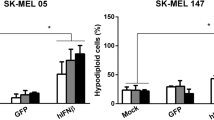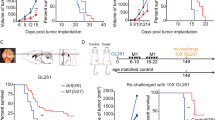Abstract
Interferon-alpha (IFN-α) or CD80 transduction of tumor cells individually reduces tumorigenicity and enhances antitumor responses. Here, we report that the combination of IFN-α and CD80 cancer gene therapy in poorly immunogenic murine tumor models, the colorectal adenocarcinoma cell line MC38, and the methylcholanthrene-induced fibrosarcoma cell line MCA205 reduces tumor growth more efficiently without affecting in vitro growth. Wild-type (WT), neomycin-resistance (Neo) gene-, or CD80-transduced tumor cells grew progressively in all immunocompetent mice. In contrast, IFN-α-transduced MC38 or MCA205 cells were rejected in 13 of 15 and seven of 15 mice, respectively. Synergistic effects were observed when IFN-α- and CD80-transduced tumor cells were mixed and inoculated. These admixed cells were rejected by 14 of 15 (MC38) or seven of 15 mice (MCA205), whereas, a mixture of IFN-α and Neo cells or CD80 and Neo cells led to tumors associated with progressive growth. Induction of long-lasting tumor immunity against WT tumor cells was demonstrated by rejection of a subsequent rechallenge in 10 of 13 (MC38) and six of seven (MCA205) tumor-free mice. The therapeutic efficacy with established WT MC38 tumors was shown when mice were treated with a vaccine consisting of repetitive injections of IFN-α- and CD80-transduced MC38 cells into the contralateral flank (P < 0.01). this treatment was associated with accumulation of cd4+, CD8+ cells and dendritic cells within the established tumor, demonstrating induction of antitumor immune responses. Combination gene therapy using IFN-α and CD80 is an effective immune therapy of cancer and could be considered for clinical trials.
This is a preview of subscription content, access via your institution
Access options
Subscribe to this journal
Receive 12 print issues and online access
$259.00 per year
only $21.58 per issue
Buy this article
- Purchase on Springer Link
- Instant access to full article PDF
Prices may be subject to local taxes which are calculated during checkout






Similar content being viewed by others
References
Chen L, Linsley PS, Hellstrom KE . Costimulation of T cells for tumor immunity Immunol Today 1993 14: 483–486
Colombo MP, Forni G . Cytokine gene transfer in tumor inhibition and tumor therapy: where are we now? Immunol Today 1994 15: 48–51
Ferrantini M et al. IFN-α1 gene expression into a metastatic murine adenocarcinoma (TS/A) results in CD8+ T cell-mediated tumor rejection and development of antitumor immunity. Comparative studies with IFN-γ-producing TS/A cells J Immunol 1994 153: 4604–4615
Kaido T et al. IFN-α1 gene transfection completely abolishes the tumorigenicity of murine B16 melanoma cells in allogeneic DBA/2 mice and decreases their tumorigenicity in syngeneic C57BL/6 mice Int J Cancer 1995 60: 221–229
Santodonato L et al. Cure of mice with established metastatic Friend leukemia cell tumors by a combined therapy with tumor cells expressing both interferon-α1 and herpes simplex thymidine kinase followed by ganciclovir Hum Gene Ther 1996 7: 1–10
Coleman M et al. Noviral interferon α gene therapy inhibits growth of established tumors by eliciting a systemic immune response Hum Gene Ther 1998 9: 2223–2230
Greenberg PD . Adoptive T cell therapy of tumors: mechanisms operative in the recognition and elimination of tumor cells Adv Immunol 1991 49: 281–355
Bretscher P . The two-signal model of lymphocyte activation twenty-one years later Immunol Today 1992 13: 74–76
Parry RV et al. Evidence that a kinase distinct from protein kinase C and phosphatidylinositol 3-kinase mediates ligation-dependent serine/threonine phosphorylation of the T-lymphocyte co-stimulatory molecule CD28 Biochem J 1997 15: 249–257
Linsley PS, Clark EA, Ledbetter JA . T-cell antigen CD28 mediates adhesion with B cells by interacting with activation antigen B7/BB1 Proc Natl Acad Sci USA 1990 87: 5031–5035
Linsley PS et al. Binding of the B cell activation antigen B7 to CD28 costimulates T cell proliferation and interleukin 2mRNA accumulation J Exp Med 1991 173: 721–730
June CH, Ledbetter JA, Linsley PS, Thompson CB . Role of the CD28 receptor in T-cell activation Immunol Today 1990 11: 211–216
Harding FA et al. CD28-mediated signaling costimulates murine T cells and prevents induction of anergy in T cell clones Nature (London) 1992 356: 607–609
Harding FA, Allison JP . CD28–B7 interactions allow the induction of CD8+ cytotoxic T lymphocytes in the absence of exogenous help J Exp Med 1993 177: 1791–1796
Gimmi CD et al. Human T-cell clonal anergy is induced by antigen presentation in the absence of B7 costimulation Proc Natl Acad Sci USA 1993 90: 6586–6590
Chen L et al. Co-stimulation of antitumor immunity by the B7 counterreceptor for the lymphocyte molecules CD28 and CTLA-4 Cell 1992 71: 1093–1102
Townsend SE, Allison JP . Tumor rejection after direct costimulation of CD8+ T cells by B7-transfected melanoma cells Science 1993 259: 368–370
Chen L et al. Tumor immunogenicity determines the effect of B7 costimulation on T cell-mediated tumor immunity J Exp Med 1994 179: 523–532
Zitvogel L et al. Interleukin-12 and B7.1 co-stimulation cooperate in the induction of effective antitumor immunity and therapy of established tumors Eur J Immunol 1996 26: 1335–1341
Hiroishi K, Tüting T, Lotze MT . Interferon-α-expressing tumor cells enhance generation and promote survival of tumor-specific cytotoxic T cells J Immunol (in press)
Marrack P, Kappler J, Mitchell T . Type I interferons keep activated T cells alive J Exp Med 1999 189: 521–529
Ferbas JJ et al. CD4+ blood dendritic cells are potent producers of IFN-α in response to HIV-1 infection J Immunol 1994 152: 4649–4662
Luft T et al. Type I IFNs enhance the terminal differentiation of dendritic cells J Immunol 1998 161: 1947–1953
Mayordomo JI et al. Bone marrow-derived dendritic cells pulsed with synthetic tumour peptides elicit protective and therapeutic antitumour immunity Nature Med 1995 1: 1297–1302
Zitvogel L et al. Therapy of murine tumors with tumor peptide-pulsed dendritic cells: dependence on T cells, B7 costimulation, and T helper cell 1-associated cytokines J Exp Med 1996 183: 87–97
Pène J et al. IgE production by normal human lymphocytes is induced by interleukin 4 and suppressed by interferons γ and α and prostaglandin E2 Proc Natl Acad Sci USA 1988 85: 6880–6884
Lane HC et al. Interferon-α in patients with asymptomatic human immunodeficiency virus (HIV) infection. A randomized, placebo-controlled trial Ann Intern Med 1990 112: 805–811
Parronchi P et al. IL-4 and IFN (α and γ) exert opposite regulatory effects on the development of cytolytic potential by Th1 or Th2 human T cell clones J Immunol 1992 149: 2977–2983
Brinkmann V, Geiger T, Alkan S, Heusser CH . Interferon α increases the frequency of interferon γ-producing human CD4+ T cells J Exp Med 1993 178: 1655–1663
Belardelli F . Role of interferons and other cytokines in the regulation of the immune response APMIS 1995 103: 161–179
Tan MH, Holyoke ED, Goldrosen MH . Murine colon adenocarcinomas: methods for selective culture in vitro J Natl Cancer Inst 1976 56: 871–873
Reeves ME et al. Retroviral transduction of human dendritic cells with a tumor-associated antigen gene Cancer Res 1996 56: 5672–5677
Tüting T et al. Interferon-α gene therapy for cancer: retroviral transduction of fibroblasts and particle-mediated transfection of tumor cells are both effective strategies for gene delivery in murine tumor models Gene Therapy 1997 4: 1053–1060
Pear WS, Nolan GP, Scott ML, Baltimore D . Production of high-titer helper-free retroviruses by transient transfection Proc Natl Acad Sci USA 1993 90: 8392–8396
Acknowledgements
We thank Prof Keiji Mitamura (Showa University, Tokyo, Japan) for his encouragement and support, and appreciate Drs Joseph Baar, Hiromune Shimamura, Galina V Shurin, Ronna L Campbell, Quan Cai, Yasuhiko Nishioka, Takashi Iwazawa, Christine Odoux (University of Pittsburgh, PA) for helpful discussion. We also thank Mr Robbie B Mailliard, Mr Alexander Ducruet and Ms Madeline A Wahl (University of Pittsburgh, PA) for their outstanding technical assistance. This study was supported in part by grants from Schering-Plough Institute, PO1CA68067-01, and PO1CA73743-01 to Michael T Lotze.
Author information
Authors and Affiliations
Rights and permissions
About this article
Cite this article
Hiroishi, K., Tüting, T., Tahara, H. et al. Interferon-alpha gene therapy in combination with CD80 transduction reduces tumorigenicity and growth of established tumor in poorly immunogenic tumor models. Gene Ther 6, 1988–1994 (1999). https://doi.org/10.1038/sj.gt.3301034
Received:
Accepted:
Published:
Issue Date:
DOI: https://doi.org/10.1038/sj.gt.3301034
Keywords
This article is cited by
-
Effects of interferon-α-transduced tumor cell vaccines and blockade of programmed cell death-1 on the growth of established tumors
Cancer Gene Therapy (2012)
-
Dendritic cell therapy with interferon-α synergistically suppresses outgrowth of established tumors in a murine colorectal cancer model
Gene Therapy (2006)
-
Intratumoral injection of IL-secreting syngeneic/allogeneic fibroblasts transfected with DNA from breast cancer cells prolongs the survival of mice with intracerebral breast cancer
Cancer Gene Therapy (2005)
-
Interleukin-4 gene transduced tumor cells promote a potent tumor-specific Th1-type response in cooperation with interferon-α transduction
Gene Therapy (2005)
-
Interferon-α and interleukin-12 gene therapy of cancer: interferon-α induces tumor-specific immune responses while interleukin-12 stimulates non-specific killing
Cancer Immunology, Immunotherapy (2003)



